# Mock
# Overview
ezFlap has built-in support for:
- Partial mocking of dependency-injected services.
- Mocking hosted widgets.
# Services
Services are semi-mocked: the mock class must extend the original service class.
# Declaration
A mock class can override all of the original service's public methods.
Note: when the tested widget calls a service method that wasn't mocked - the original method's code is invoked.
Mock example:
# Original Service
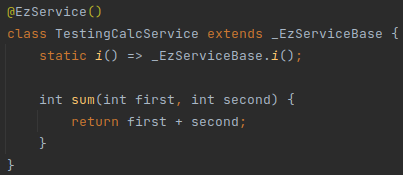
# Mocked Service

In the above example we define a _Mock_TestingCalcService class that extends our TestingCalcService service, and
overrides its sum() method.
# Provide to Widget Wrapper
Mocked services are provided to WidgetWrapper using its constructor's mapDIOverrides parameter.
# Original Service

# Widget
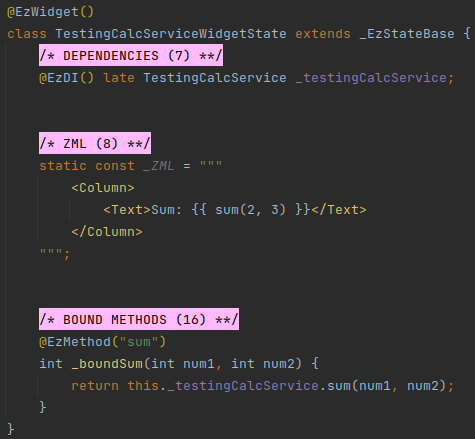
# Test
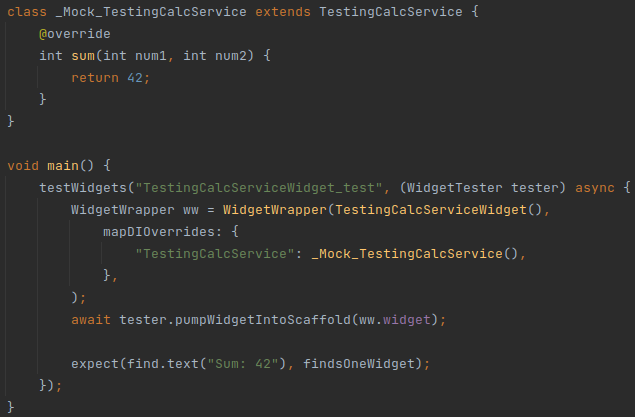
In the above example:
- We use WidgetWrapper's constructor's
mapDIOverridesparameter to provide WidgetWrapper with the mocked version of TestingCalcService.
Note the following points:
- The name _Mock_TestingCalcService is arbitrary; any name can be used.
- In the above example, _Mock_TestingCalcService is defined "locally" in the test file, but for real-life applications, it is often convenient to create a separate library of mocks that can be re-used by multiple tests.
- The keys of the
mapDIOverridesparameter need to match the names of the service classes. - Only services that are made available to the widget using ezFlap dependency injection (i.e. have an
@EzDIannotation) can be mocked this way. - The mock is made available only to the widget wrapped by the WidgetWrapper instance.
- If that widget hosts other widgets, and these hosted widgets also have the service injected as a dependency (i.e.
with
@EzDI), then these hosted widgets will not get the mocked service.
- If that widget hosts other widgets, and these hosted widgets also have the service injected as a dependency (i.e.
with
# Log Function Calls
ezFlap offers the TestWrapperMixin utility mixin.
This mixin offers some utility functions that can be used by mocks to keep track of invocations of the mocked service's methods.
# Mocked Service
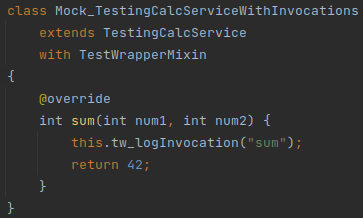
In the above example, TestWrapperMixin.tw_logInvocation() is used to log every invocation of the sum() method.
# Widget
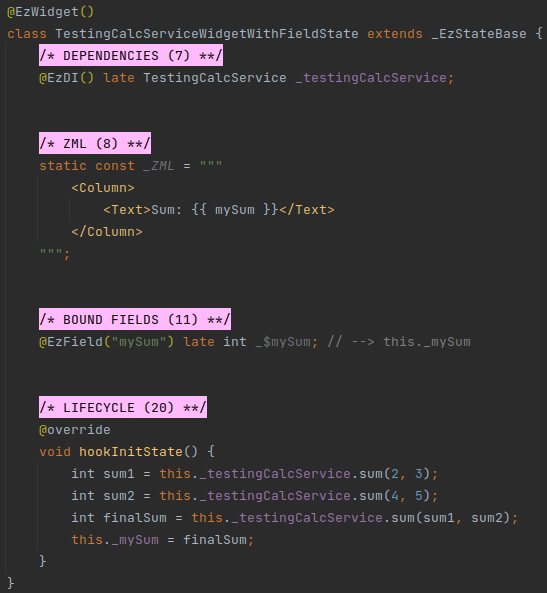
In the above example, TestingCalcService.sum() is invoked three times.
# Test
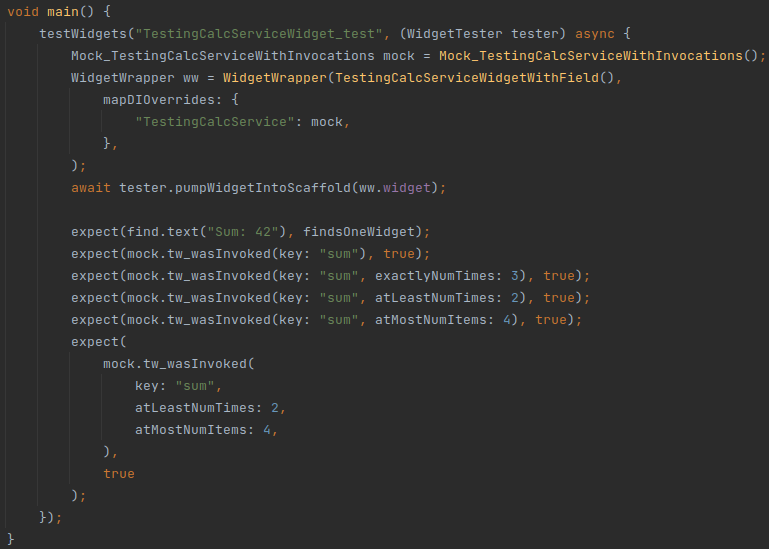
The above example shows the different ways to check whether a certain mocked method was called, and how many times,
using the TestWrapperMixin.tw_wasInvoked() method with various combinations of its named parameters:
key- specify the key under which the invocation was recorded (i.e. the value passed toTestWrapperMixin.tw_logInvocation()in the mocked service).exactlyNumTimes- the exact number of times the method is expected to have been invoked.atLeastNumTimesatMostNumTimes
Only key is mandatory.
When the exact, minimum, and maximum number of times are not specified - tw_wasInvoked() will return true if the
method was invoked at least once.
# Log Function Calls With Data
TestWrapperMixin allows to record additional data alongside the logging of method invocations:
- A custom String.
- A List of parameters.
For example:
# Mocked Service
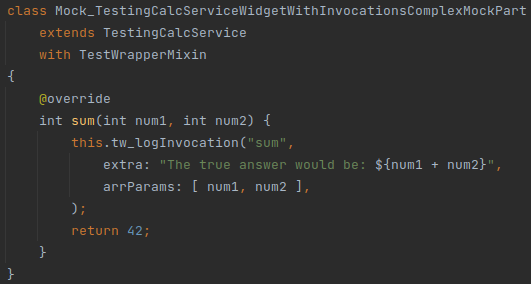
# Widget
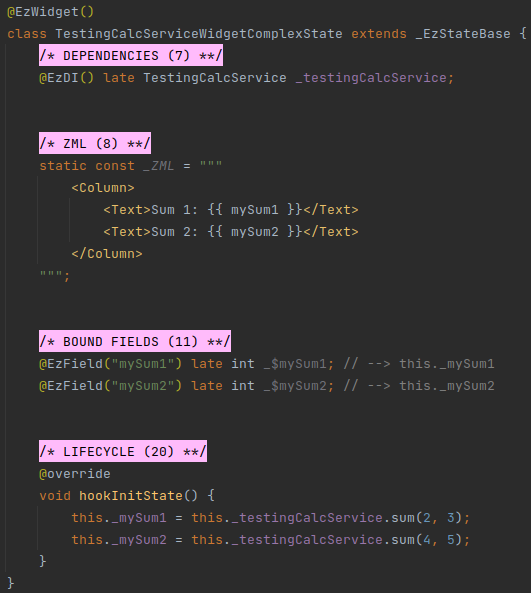
# Test
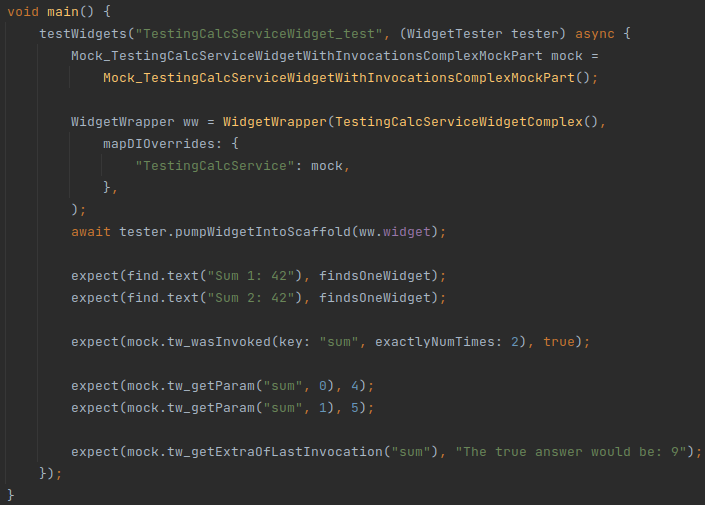
In the above example:
TestWrapperMixin.tw_getParamis called twice - once to get the first parameter (i.e.num1), and once to get the second (num2).- Note:
tw_getParamalways gets the parameters of the last invocation of the method (i.e. the last invocation of the method whose key is passed totw_getParam).
- Note:
TestWrapperMixin.tw_getExtraOfLastInvocationgets the text that was passed totw_logInvocationin theextraparameter (in the last invocation).
# Hosted Widgets
It is common for ezFlap widgets to host other ezFlap widgets.
When testing an ezFlap widget, all of its hosted ezFlap widgets will be instantiated as they would in the real application.
Sometimes we may want to mock such hosted ezFlap widgets during a test, or even to just "disable" them (i.e. make the widget that is being tested not instantiate them).
Mocked ezFlap widgets are passed to WidgetWrapper's constructor using the mapHostedWidgetMockFactories parameter.
# Disable Hosted Widget
The simplest form is to just prevent a hosted widget from being instantiated:
# Hosted Widget
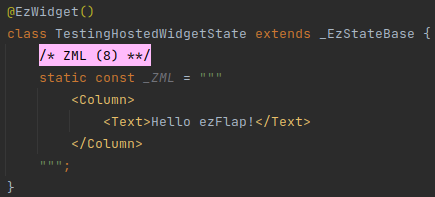
# Host Widget
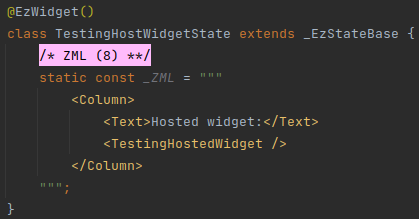
# Test
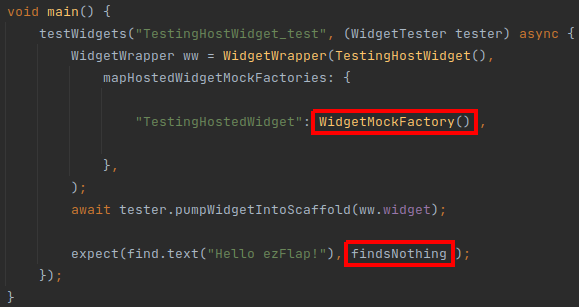
As seen in the above example, mapHostedWidgetMockFactories expects:
- A String key, with the name of the hosted widget to be mocked or disabled.
- A WidgetMockFactory instance.
WidgetMockFactory is a helper class provided by ezFlap.
The simplest way to use it is as seen above - instantiate it without any parameters and pass it to
mapHostedWidgetMockFactories.
In such case, the hosted TestingHostedWidget widget will be replaced with an empty Container.
If we want to have TestingHostedWidget replaced with a different widget - we will provide a builder function to
WidgetMockFactory's constructor, in the funcWidgetFactory parameter:
# Test
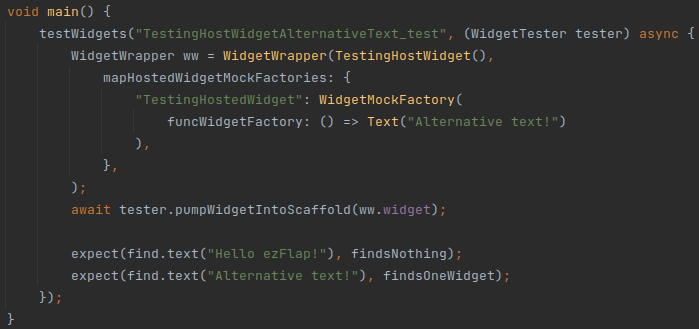
# Mock Hosted Widget
In rare occasions, we will want to actually have the hosted ezFlap widget replaced with another ezFlap widget.
This is mainly useful when the widget we are testing obtains a reference to its hosted widget (i.e. using @EzRef),
and invokes public methods that the hosted widget exposes.
In such case we may want to not actually render the hosted widget, but to make a mock available to the tested widget,
because it may have code that relies on the @EzRef field being populated, and will crash if it's not.
We may also want to capture calls to the hosted widget's public methods, to verify that the host widget behaves correctly, and also to return sensible values to it (again, so that it won't behave incorrectly, or even crash).
Mocking a hosted widget consists of the following steps:
- Define an interface (i.e. abstract class) and declare the same public methods that are exposed by the hosted widget we wish to mock.
- Have the to-be-mocked hosted widget implement the interface.
- Set the type of the tested widget's
@EzRefto the interface. - Create the class to actually do the mocking. This class will:
- Implement the aforementioned interface.
- Extend ezFlap's MockWidgetStateBase helper class.
We will go over these steps one by one, in the following examples:
# Interface
An abstract class that declares the public functions that can be mocked:
# Hosted Widget
The to-be-mocked hosted widget implements the ITestingHostedWidgetForRefState interface:
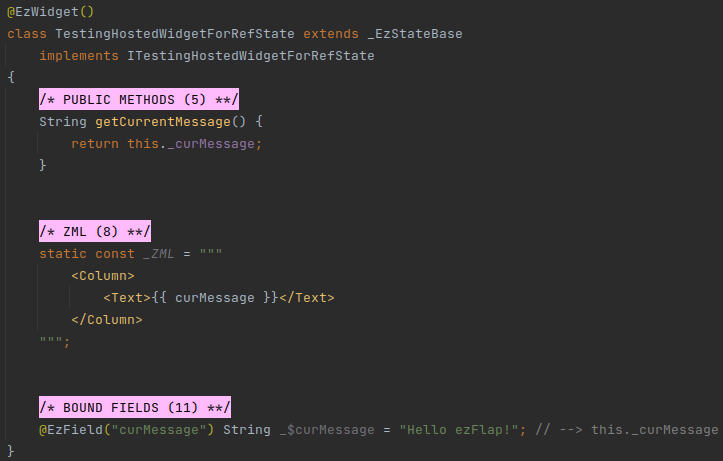
# Host Widget
The type of the @EzRef field in the host widget is set to the interface (i.e. ITestingHostedWidgetForRefState?):
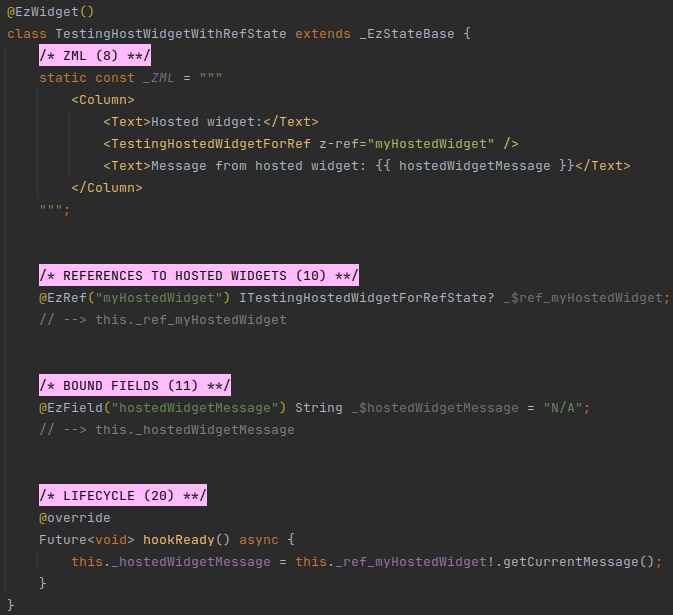
# Mock Class
The actual mock class extends ezFlap's utility MockWidgetStateBase and implements the ITestingHostedWidgetForRefState interface:

# Test
In the test, WidgetWrapper is initialized with the mapHostedWidgetMockFactories constructor parameter, with an
instance of WidgetMockFactory, which is passed a factory function that instantiates the mock class in its
funcCreateMockWidgetState constructor parameter:
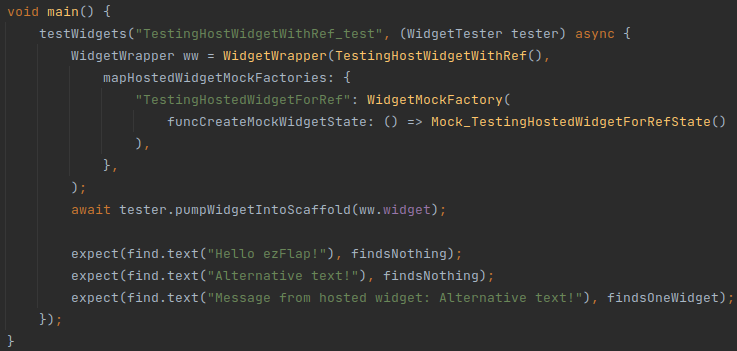
# Interact with Mocked or Disabled Hosted Widget
WidgetWrapper offers method to access and interact with mocked or "disabled" hosted widgets.
The below example shows how to check that the desired prop values were provided by a hosted widget to a hosted widget that has been disabled.
# Hosted Widget
The to-be-disabled hosted widget has a couple of props defined.
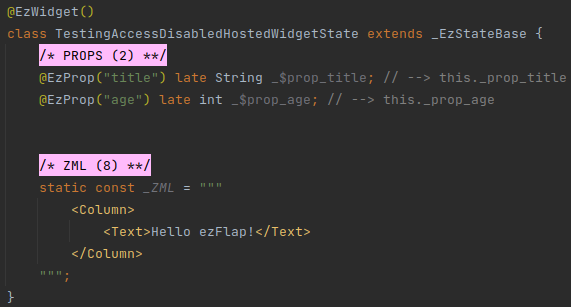
# Host Widget
The host widget provides values for the hosted widget's props.
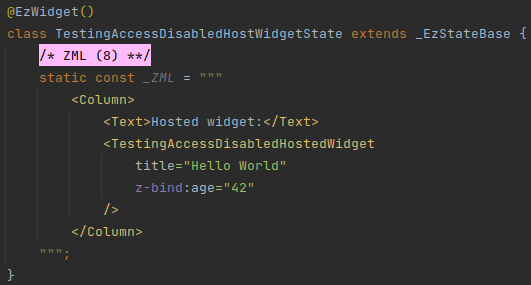
# Test
The test disables the hosted widget by using the WidgetMockFactory class instantiated with the defaults.
Then, it gets the instance of WidgetMock (described later), which provides utility methods for getting information concerning the mocked widget.
Then, it verifies that both props were actually populated (i.e. by the host widget), and also verifies their values.
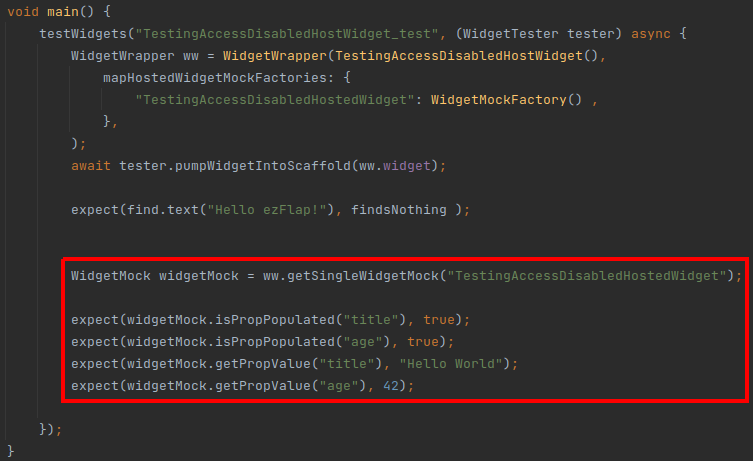
# WidgetMock
The WidgetMock class is created and initialized automatically by ezFlap, and is used as a container around a widget mock.
It provides the following methods:
bool isPropPopulated(String assignedName)- returns true if a prop with the Assigned NameassignedNamewas populated (e.g. with az-bindattribute).dynamic getPropValue(String assignedName)- returns the value the prop was populated with.- Returns null if the prop was not populated.
WidgetWrapper provides three methods that allow to retrieve WidgetMock instances of the wrapped widget:
List<WidgetMock> getWidgetMocks(String widgetName)- returns a List with zero or more WidgetMock instances of the mocks of the widget with the namewidgetName.WidgetMock getSingleWidgetMock(String widgetName)- returns a single WidgetMock and throw exception if there are no mock instances ofwidgetName, or if there are more than one.WidgetMock? tryGetSingleWidgetMock(String widgetName)- the same asgetSingleWidgetMock, but returns null if there are zero or suitable multiple mock instances.